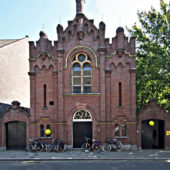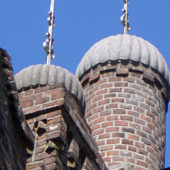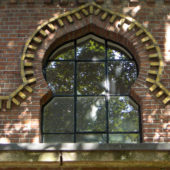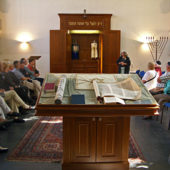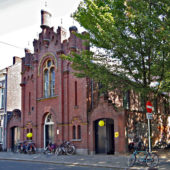Much of the town of Tilburg is red brick, and its synagogue is no exception.
Tilburg Synagogue is a small, but vibrant Liberal congregation seeking to maintain an open and tolerant atmosphere, where they can experience Jewishness with full respect for their tradition in an egalitarian and progressive manner.
In 1767, a continuous presence of Judaism began, when a Jewish citizen was given permission to settle in Tilburg, despite objections by the city council. By 1791, several other Jewish families also moved into Tilburg. Due to growing industry, many Jews from Oisterwijk, where the textile industry was in decline, were moving into Tilburg. Most Jews in Tilburg worked in the textile industry, retail trade, and the meat business. In 1820 a building on Piusplein was purchased and converted to a synagogue. The congregation subsequently moved to a larger building on the Zomerstraat. However, due to the rapidly increasing Jewish population, by 1873-1874, the congregation had outgrown their synagogue and built a larger synagogue one at Tilburg Synagogue’s present address. At the time, the street was named Comediestraat, which is the present day Willem II-straat.
In 1855 the community opened a cemetery on the Bredaseweg in Tilburg. Unlike many Jewish communities in Europe, their numbers did not decrease over the years, due to the healthy economic environment of the area. During the 1930s, there was a small influx of German Jewish refugees. After the Nazis had swarmed over the Netherlands, a Jewish school was established in Tilburg in 1941. A Jewish council was established in 1942. This council, in combination with the community directorate, governed the community of Tilburg. The community directorate was the board which provided aid to the poor. Sadly, between August of 1942 and April of 1943, the majority of Tilburg Jews were deported and subsequently, 130 Tilburg Jews were killed in the Holocaust, yet some survived by hiding.
The interior of the synagogue was entirely decimated. During the occupation, the Germans used the Synagogue to hold furnishings and ceremonial objects stolen from other nearby synagogues. A memorial stone honoring the Jews of Tilburg who were killed in the Holocaust was unveiled at the cemetery. After the war was over, the Jewish community of Tilburg was revived and the Synagogue was re-inaugurated in 1949. In 1976 the Synagogue was given to the government; thereafter serving the community in social and cultural functions. However, in 1998 Tilburg Synagogue was re-established as a Synagogue for the Liberal Jewish community.
Tilburg Synagogue boasts a brick Moorish façade, with paned windows detailed with Moorish shaping along the sides of the building, Moorish detailing and motifs featured in the brickwork, with multiple domed turrets reaching to the sky. Three stained glass windows sit above the entrance, two elongated windows, which are arched at the top, with a round window sitting between the curves of the arched tops of the elongated windows. Inside the prayer room, the walls are ivory colored, Moorish shaped, paned windows line the sides of the room, there is a barrel shaped ceiling, paneled and painted in green and the floors are covered with large, gray slate-like tiles. The Aron Kodesh is, as traditional, at the East end of the room, and is classically styled in wood, with engraving in Hebrew and gilded in gold. A green curtain elaborately embroidered and tasseled in gold is drawn across the front of it. A round stained glass window is situated above the Aron Kodesh. Across the room, near the entrance, is the tevah (reader’s desk). Blue chairs are lined up in rows, against the side-walls, inwards. Red-patterned Turkish-styled rugs lie on the floor in between the seats.
This congregation meets every two to three weeks for Shabbat, and on High Holidays. Several times a year they meet with their Rabbi or a speaker to learn more about their traditions or about a relevant topic. Circumcisions, Bar and Bat Mitzvahs are all part of the traditions celebrated by the congregation.
Although Tilburg never had a large Jewish community, the Jews in Tilburg have an old history. Though the Synagogue closed down for a short period of time, it has been re-opened since 1998 and it continues to serve the community and to have a voice. The Jews of Tilburg continue to meet there to celebrate their Jewishness and to keep alive the traditions, culture and faith of their forefathers.

